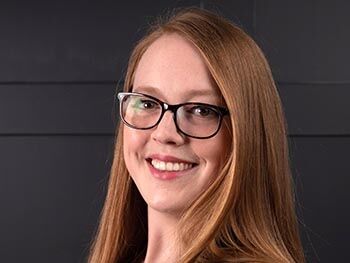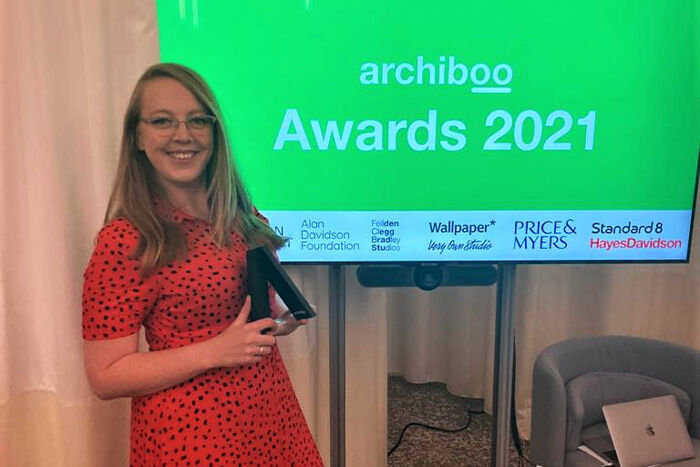Architecture alumna celebrates activism award win

An Architecture graduate is celebrating after being awarded the Activism Award at this year’s Archiboo Awards.
Amy Francis-Smith graduated with a MArch (RIBA Part 2) from BCU in 2019 before completing a Postgraduate Diploma in Architectural Practice (RIBA Part 3 Exemption) earlier this year.
Now working as an Architect for Birmingham-based firm Pinnegar Hayward Design LLP, Amy was awarded the Activism award at a ceremony in London earlier this month after fighting for inclusive design and issues close to her heart.
She said: “The award was created to highlight people in the industry who had fight for good causes. I was up against organisations who are tackling inequality and homelessness, so being the only individual nominated, I was really surprised to have won it.”
Amy’s determination to be an advocate for inclusive design stems from her own ill health, with multiple severe chronic illnesses and disabilities.
She said: “Just a few years before joining BCU, I was diagnosed with a rare life-threatening condition. I've got a condition where I have several chronic illnesses, but the main one is Mast Cell Activation Syndrome (MCAS). At the time, just about every organ in my body was failing and I was going into anaphylaxis daily, with no sort of obvious pattern. It was like being allergic to the world; I was reacting to nearly every food going, as well as fragrances, perfume, the smell of petrol, creams and even medicines. I couldn't leave my room and I had no energy.
“Around the same time, I was also diagnosed with Crohn's Disease. So it's been quite difficult to manage, especially with having to re-learn how to live my life and learning what I can and can't do. It’s taken me an awfully long time to get to where I am now. This is what inspires me to do what I'm doing and to help people out. In total, it took me 12 years to become an architect, but I’m so proud of where I’m at now.”

Alongside her architect role, Amy has thrown herself into the industry, taking on the role of Vice President of the Birmingham Architectural Association, as well as being a Design Council Expert for the Design Council, where she specialises in accessible housing and inclusive design.
The graduate is also an Advisory Board Committee Member at Habinteg, a housing association specifically for disabled housing, as well as being a Visiting Lecturer at BCU and doing consultancy work around inclusive workspaces, employment and how designers can be more socially responsible in their work. Recently, she was voted in the Shaw Trust’s Disability Power 100 for the second year in a row, which celebrates Britain's most influential disabled people.
Amy has also been shortlisted for the RIBA Rising Star award and aims to continue to use her voice to raise awareness of key issues. She said: “I was shocked to be shortlisted for the RIBA Rising Star award. The kind of people that have always been on the list in previous years are the ones that go on to do really cool stuff in the industry and they often use their voice to make some real changes too. So when I heard that I'd been selected, I was completely blown away.
“There are 14.1 million disabled people in the UK which is a huge amount, that's one in five people, and many are currently in need of accessible housing. When I was starting to learn about that, I was shocked by just how many people are really struggling and suffering. The rate that accessible housing is being built is beyond demand. I'm hoping that by making people a bit more aware, they will consider these issues in their day to day life and work too.”
After her huge success, Amy is now looking forward to the future, with one main goal in mind. She said: “In the future, I want to disrupt the industry more. Get people to recognise that they have not just a moral and legal, but a social responsibility, to all members of society. Many people become disabled at some point in their life rather than being born with it. So it can happen to any of us at any time. The world just isn't set up for disabled people and we need to change that.
“My advice to current Architecture students would be to change the status quo, and always ask who isn't in the room and why they aren’t in that room. Ask yourself, how can you, as a designer, or as an individual, help make sure that everyone gets into that space, especially if the building itself is inaccessible. Spaces need to be more inclusive; ask yourself how they can be.
“I am so proud that I've been able to make even just one or two people more aware of these issues, for them to change their work and designs that has then helped people in need. Personally, I am very proud to have become an architect; it’s taken me 12 years to get here, but I finally did it.”